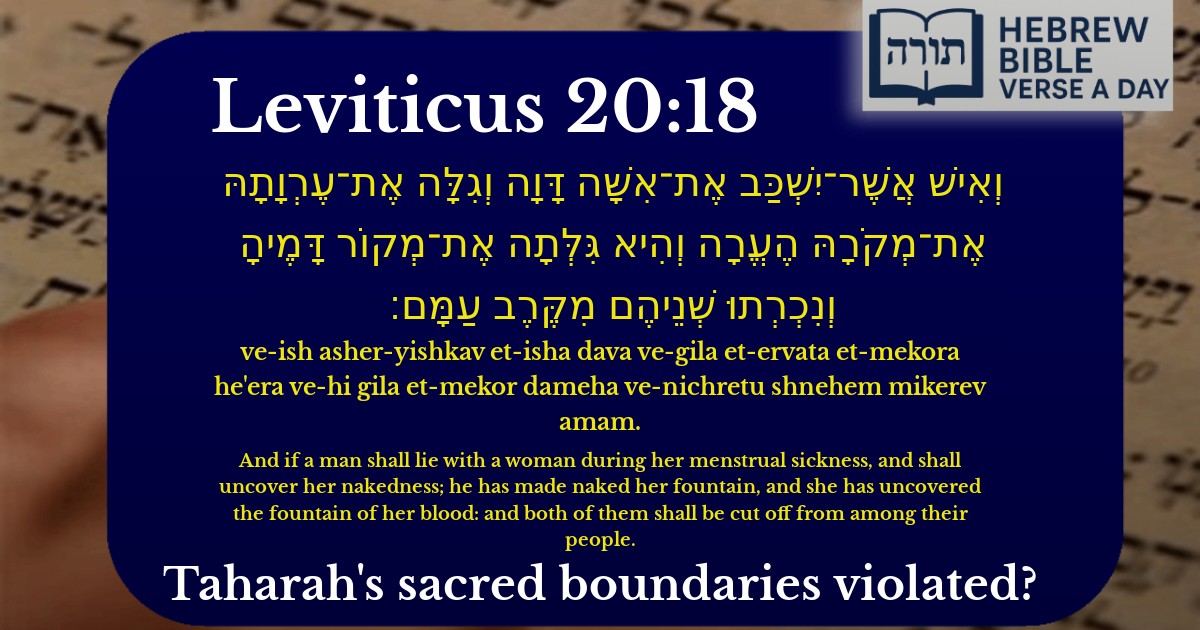Join Our Newsletter To Be Informed When New Videos Are Posted
Join the thousands of fellow Studends who rely on our videos to learn how to read the bible in Hebrew for free!
Hebrew Text
וְאִישׁ אֲשֶׁר־יִשְׁכַּב אֶת־אִשָּׁה דָּוָה וְגִלָּה אֶת־עֶרְוָתָהּ אֶת־מְקֹרָהּ הֶעֱרָה וְהִיא גִּלְּתָה אֶת־מְקוֹר דָּמֶיהָ וְנִכְרְתוּ שְׁנֵיהֶם מִקֶּרֶב עַמָּם׃
English Translation
And if a man shall lie with a woman during her menstrual sickness, and shall uncover her nakedness; he has made naked her fountain, and she has uncovered the fountain of her blood: and both of them shall be cut off from among their people.
Transliteration
Ve-ish asher-yishkav et-isha dava ve-gila et-ervata et-mekora he'era ve-hi gila et-mekor dameha ve-nichretu shnehem mikerev amam.
Hebrew Leining Text
וְ֠אִ֠ישׁ אֲשֶׁר־יִשְׁכַּ֨ב אֶת־אִשָּׁ֜ה דָּוָ֗ה וְגִלָּ֤ה אֶת־עֶרְוָתָהּ֙ אֶת־מְקֹרָ֣הּ הֶֽעֱרָ֔ה וְהִ֕וא גִּלְּתָ֖ה אֶת־מְק֣וֹר דָּמֶ֑יהָ וְנִכְרְת֥וּ שְׁנֵיהֶ֖ם מִקֶּ֥רֶב עַמָּֽם׃
וְ֠אִ֠ישׁ אֲשֶׁר־יִשְׁכַּ֨ב אֶת־אִשָּׁ֜ה דָּוָ֗ה וְגִלָּ֤ה אֶת־עֶרְוָתָהּ֙ אֶת־מְקֹרָ֣הּ הֶֽעֱרָ֔ה וְהִ֕וא גִּלְּתָ֖ה אֶת־מְק֣וֹר דָּמֶ֑יהָ וְנִכְרְת֥וּ שְׁנֵיהֶ֖ם מִקֶּ֥רֶב עַמָּֽם׃
🎵 Listen to leining
Parasha Commentary
📚 Talmud Citations
This verse is quoted in the Talmud.
📖 Niddah 13b
The verse is discussed in the context of the laws regarding menstrual impurity (niddah) and the severe prohibition of sexual relations during this time.
📖 Keritot 2a
The verse is referenced in relation to the punishment of karet (being cut off from the people) for transgressing this prohibition.


Prohibition of Intimacy During Niddah
The verse (Vayikra 20:18) addresses the severe prohibition of marital relations with a woman during her state of niddah (menstrual impurity). This is one of the foundational laws of taharat hamishpacha (family purity) in Halacha. The Torah uses strong language—"he has made naked her fountain"—to emphasize the gravity of this transgression, which carries the penalty of karet (spiritual excision) for both parties if violated intentionally.
Explanation of the Terminology
Severity of the Transgression
The punishment of karet (being "cut off from among their people") underscores the severity of this sin. The Talmud (Keritot 2a) lists this among the sins for which one is liable for karet, indicating its spiritual gravity. The Rambam (Hilchot Issurei Bi'ah 4:6) further explains that this prohibition is unique because it applies even if the couple is unaware of the niddah status at the time of the act, though karet only applies if done intentionally.
Moral and Spiritual Dimensions
The Midrash (Torat Kohanim 20:18) teaches that this law is not merely about ritual impurity but also about sanctifying marital life. By observing the laws of niddah, a couple elevates their relationship beyond physical desire, fostering holiness and self-discipline. The Sefer HaChinuch (Mitzvah 188) adds that this mitzvah instills reverence for the sacred boundaries set by the Torah.
Practical Halachic Implications
Shulchan Aruch (Yoreh De'ah 183-184) elaborates on the detailed laws of separation during niddah, including:
These laws ensure that the couple maintains the sanctity of their union as prescribed by the Torah.